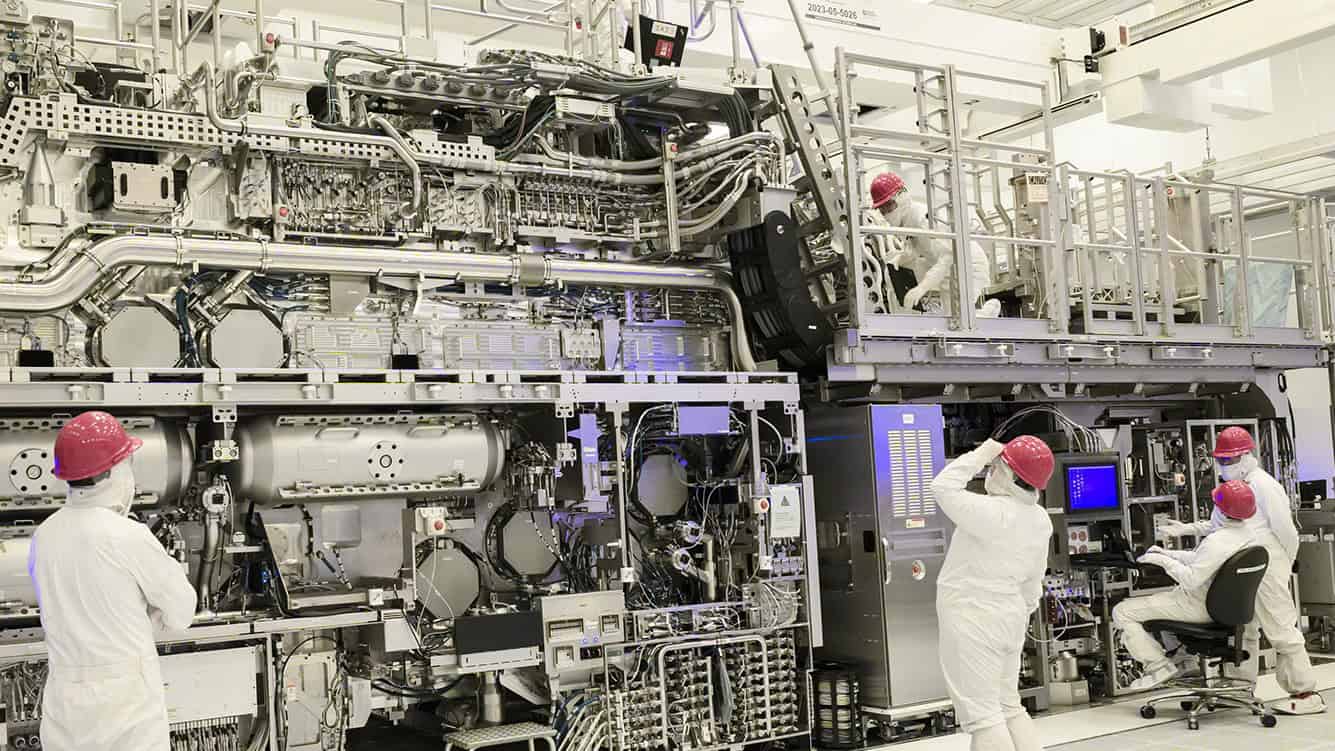In 2025, the computer manufacturing industry is booming—and not just in terms of technological innovation. Salaries across the sector are reaching all-time highs as companies race to secure top-tier talent in areas like AI, automation, robotics, and semiconductor design. If you’re looking for a financially rewarding path in tech that blends hands-on engineering with real-world impact, computer manufacturing could be your golden ticket.
The growing complexity of modern hardware—think AI-optimized chips, advanced fabrication nodes, smart manufacturing systems—has dramatically increased the demand for professionals who understand both software logic and physical systems. This demand, coupled with skill shortages in key areas, has led to six-figure salaries becoming the norm, not the exception, for many roles.
Below, we break down the best-paying jobs in computer manufacturing, updated for 2025, complete with responsibilities, qualifications, and what makes each role so valuable.
Top Computer Manufacturing Jobs Ranked by Salary
| Rank | Job Title | Salary Range (2025) | Key Skill Area | Education Required |
|---|---|---|---|---|
| 1 | Technical Program Manager | $130,000 – $500,000+ | Program & Product Leadership | Bachelor’s / Master’s in CS or Engineering |
| 2 | Machine Learning Engineer | $140,000 – $250,000 | AI & Data Science | Bachelor’s / Ph.D. in CS or AI |
| 3 | Semiconductor Design Engineer | $130,000 – $220,000 | Chip Architecture | EE or Comp. Engineering degree |
| 4 | Controls Engineer | $90,000 – $135,000 | Automation & PLC Systems | Electrical or Controls Eng. degree |
| 5 | CNC Field Service Engineer | $70,000 – $110,000 | CNC Repair & Maintenance | Technical Cert / Associate Degree |
| 6 | Module Lead | $75,000 – $120,000 | Hardware/Software Development | CS or Engineering |
| 7 | Control Systems Project Engineer | $100,000 – $150,000 | Manufacturing Automation | EE / Mechanical Engineering |
| 8 | Aseptic Production Supervisor | $65,000 – $105,000 | Cleanroom & Process Control | Manufacturing or Engineering |
| 9 | Pharmaceutical Manufacturing Supervisor | $60,000 – $145,000 | Regulated Production | Pharma or Chem. Engineering |
| 10 | Quality Control Lab Technician | $45,000 – $75,000 | Testing & QA | Associate Degree / Cert |
1. Technical Program Manager
Salary: $130K to $500K+
Tech giants like Google, Apple, and NVIDIA pay top dollar for TPMs who can oversee everything from chip fabrication timelines to cross-functional hardware/software integration. TPMs need deep technical know-how and soft skills like negotiation, budgeting, and leadership.
- Why it Pays: Direct influence over product launches and high-risk engineering projects.
- Hot Skill: Agile management in hardware development.
- Top Employers: Microsoft, Intel, AMD, Amazon Robotics
2. Machine Learning Engineer
Salary: $140K to $250K
ML Engineers in manufacturing design systems that predict machine failures, optimize production lines, and streamline quality checks. With AI integration becoming central to “smart factories,” demand is surging.
- Why it Pays: Combines software development, math, and engineering with real-world cost savings.
- Hot Skill: TensorFlow, PyTorch, scikit-learn, predictive modeling.
- Growth Outlook: +22% over the next 5 years, according to the Bureau of Labor Statistics (BLS).
3. Semiconductor Design Engineer
Salary: $130K to $220K
The chip shortage exposed just how critical semiconductor engineers are. Whether designing 3nm transistors or AI-optimized neural engines, these engineers shape the backbone of modern computing.
- Why it Pays: Massive investment in U.S. chip manufacturing (CHIPS Act) has driven up salaries.
- Top Employers: TSMC, Intel, Samsung, AMD, and Apple.
4. Controls Engineer
Salary: $90K to $135K
Controls Engineers program and maintain industrial automation systems. In 2025, they’re in high demand to design PLC systems and HMI interfaces that drive factory robotics and sensor networks.
- Why it Pays: Essential to modernizing manufacturing lines and reducing downtime.
- Skills in Demand: Siemens & Allen-Bradley PLCs, SCADA, industrial Ethernet.
5. CNC Field Service Engineer
Salary: $70K to $110K
These engineers travel to factories and data centers to install or service high-precision CNC equipment. Companies pay well for pros who can keep million-dollar machines running.
- Why it Pays: Highly specialized mechanical and diagnostic skill set.
- Travel Bonus: Many roles include per diem, car stipends, and overtime.
6. Module Lead
Salary: $75K to $120K
Module Leads are team leads overseeing hardware or software modules during the development cycle. They ensure everything stays on spec, on schedule, and on budget.
- Why it Pays: Blend of technical depth and team management.
- Hot Tip: Transition from senior developer to Module Lead can bump pay by 20–30%.
7. Control Systems Project Engineer
Salary: $100K to $150K
A more senior cousin of the Controls Engineer, these professionals lead large-scale automation projects, often coordinating multidisciplinary teams and multi-million-dollar installations.
- Why it Pays: Combines system design with cross-functional leadership.
- Industries Hiring: Automotive, aerospace, computer hardware.
8. Aseptic Production Supervisor
Salary: $65K to $105K
Especially important in cleanroom environments, these supervisors keep contamination-sensitive manufacturing lines (like chip fabrication) running smoothly and within compliance.
- Why it Pays: Cleanroom violations can shut down entire lines.
- Typical Background: Engineering + Six Sigma or GMP experience.
9. Pharmaceutical Manufacturing Supervisor
Salary: $60K to $145K
This role straddles pharmaceutical and tech sectors, especially in hybrid plants that produce electronics used in medical equipment.
- Why it Pays: Regulatory complexity, cross-industry knowledge.
- Perks: Strong benefits and job security due to health sector overlap.
10. Quality Control Lab Technician
Salary: $45K to $75K
While not the highest on the list, this is an excellent entry-level position in the manufacturing space. QC Lab Techs test components using microscopes, spectrometers, and software suites.
- Why it Pays: Critical for product reliability and safety compliance.
- Certifications Help: ASQ or Certified Quality Technician (CQT) credentials can raise salary potential.
The Bigger Picture: Why Manufacturing Jobs Are Getting More Lucrative
- Global Reshoring: The U.S. and Europe are bringing more semiconductor and electronics manufacturing back home, increasing local job opportunities.
- CHIPS Act & Infrastructure Spending: Government funding for domestic production has led to aggressive hiring and salary competition.
- Rise of Smart Manufacturing: IoT sensors, AI systems, and digital twins are turning factories into high-tech environments, increasing the need for hybrid tech/manufacturing skillsets.
What You Need to Succeed
🔧 Key Skills for 2025
- Automation Programming (PLC/SCADA)
- AI & Machine Learning
- Robotics and Mechatronics
- Semiconductor Design & Testing
- Project Management (Agile, PMP)
🎓 Recommended Education & Certifications
- Bachelor’s degree in Computer/Electrical Engineering or Computer Science
- Certifications: Six Sigma, PMP, Certified Manufacturing Engineer (CMfgE), or AI-specific courses from platforms like Coursera, edX, or NVIDIA Deep Learning Institute
Final Thought
The era of low-paid factory work is long gone—today’s computer manufacturing jobs are cutting-edge, high-paying, and foundational to everything from smartphones to space tech. Whether you’re just starting your career or looking to pivot into a booming field, investing in the right skills can land you a role with serious financial upside and long-term stability.
1. Machine Learning Engineer
Machine Learning Engineers are among the top earners in computer manufacturing today. They create and implement AI algorithms that help machines learn from data and make decisions without human input.
These professionals earn over $140,000 annually because their skills are in high demand yet short supply. Their work directly impacts product innovation and efficiency in manufacturing.
The role requires strong programming skills in languages like Python and expertise in statistics. Engineers must understand complex mathematical concepts to build effective machine learning models.
Major tech companies like Apple, Adobe, and Qualcomm actively seek these specialists for their teams. They offer competitive compensation packages to attract top talent.
Job listings on employment websites show numerous positions with salaries starting at $110,000 and often reaching much higher levels. Some manufacturing positions offer between $120,000 and $150,000 annually.
Machine Learning Engineers in manufacturing focus on optimizing production lines, quality control, and predictive maintenance. They help factories become smarter and more efficient.
The path to this career typically requires a degree in computer science, extensive programming experience, and specialized training in AI and machine learning. Many professionals also hold advanced degrees.
Industry experience can significantly boost earning potential. Engineers who demonstrate successful implementation of machine learning solutions can command premium salaries.
As automation increases in manufacturing, these roles will become even more crucial. Companies are willing to pay premium salaries for professionals who can give them a competitive edge through AI implementation.
2. Control Systems Project Engineer
Control Systems Project Engineers play a crucial role in computer manufacturing. They design and implement automated systems that control various manufacturing processes. These professionals ensure that production lines run smoothly and efficiently.
The salary range for these positions is impressive. Control Systems Project Engineers can earn between $100,000 and $150,000 per year according to job listings on Indeed. Some positions offer additional benefits like referral programs, parental leave, and health insurance.
In Ohio specifically, these professionals can expect to earn between $82,000 and $137,000 annually. There are currently over 800 job opportunities in Ohio for Controls Project Engineers.
What makes this role so valuable? Control Systems Engineers design, develop, and test automated systems that keep manufacturing operations running. Their expertise directly impacts production efficiency and quality control.
The highest-paying positions in this field often go to those with specialized knowledge and experience. Some Controls Engineers who focus purely on technical work (without management responsibilities) can earn between $100,000 and $125,000, as noted by professionals in industrial automation.
Job location also affects compensation. In Cincinnati, Control Systems Engineers can find positions with salaries ranging from $105,000 to $176,520 at various companies hiring in the area.
Education requirements typically include a degree in electrical engineering, computer engineering, or a related field. Most employers look for candidates with strong programming skills and knowledge of industrial control systems.
For those seeking the absolute highest compensation in this field, specialized roles can pay up to $189,000 annually according to ZipRecruiter’s analysis of the highest-paying Control Engineer jobs in 2025.
3. Pharmaceutical Manufacturing Supervisor
Pharmaceutical manufacturing supervisors play a critical role in the production of medications and medical products. They oversee daily operations on the manufacturing floor and ensure quality standards are met.
The salary for this position is quite competitive. As of March 2025, pharmaceutical manufacturing supervisors earn an average of $71,398 per year in the United States. This breaks down to about $34.33 per hour.
Salary ranges can vary widely based on experience and location. Job postings show positions with salaries ranging from $60,000 to $145,000, making this a potentially lucrative career path within manufacturing.
In Texas specifically, pharmaceutical manufacturing supervisor positions typically offer $60,000 to $65,000 annually. These roles often come with benefits like health insurance, paid time off, and 401(k) plans.
When compared to general manufacturing supervisors, pharmaceutical specialists tend to earn more. The median salary for general manufacturing supervisors is $76,170 per year, while pharmaceutical supervisors often command higher pay due to specialized knowledge requirements.
Job responsibilities typically include coordinating production teams, maintaining compliance with FDA regulations, and implementing quality control procedures. The specialized nature of pharmaceutical manufacturing adds complexity that justifies the higher compensation.
For those interested in this field, there are currently numerous job openings across the country. Many employers seek candidates with background in pharmaceutical sciences or engineering, plus several years of manufacturing experience.
The job outlook remains strong, with steady demand for skilled supervisors who can navigate the complex regulatory environment of pharmaceutical manufacturing while maintaining efficient production.
4. Quality Control Lab Technician
Quality Control Lab Technicians play a crucial role in computer manufacturing. They test components and finished products to ensure they meet quality standards before shipping to customers.
These professionals earn an average of $21.71 per hour in the United States. This translates to a competitive annual salary, especially in the manufacturing sector.
Regional differences impact earnings significantly. Lab technicians in some areas make $21 per hour, which is about 30% higher than national averages for similar positions.
The job involves analyzing specimens and materials using specialized equipment. Technicians document results, flag defective items, and help maintain quality control systems throughout the production process.
Entry-level positions typically require technical training or an associate degree. Experience with testing equipment and knowledge of manufacturing processes increase employment prospects and earning potential.
Career advancement opportunities exist for those who excel in this role. Some technicians move into senior quality positions or specialized testing roles with salaries reaching much higher levels in certain companies.
The work environment is typically clean and structured. Technicians spend most of their time in lab settings, though they may need to visit production floors to collect samples or investigate quality issues.
Job stability is another benefit of this career path. As long as computer manufacturing continues, companies will need skilled professionals to maintain quality standards and prevent defective products from reaching consumers.
For those who enjoy methodical work in a lab setting but want decent compensation, this role offers a good balance. The technical nature of the work combined with reasonable pay makes it an attractive option within computer manufacturing.
5. CNC Field Service Engineer
CNC Field Service Engineers play a vital role in the computer manufacturing industry. They travel to client sites to install, repair, and maintain CNC (Computer Numerical Control) machines that are essential for precision manufacturing.
As of March 2025, these professionals earn an average salary of $77,794 per year in the United States. This breaks down to about $37.40 per hour, making it one of the better-paying jobs in the field.
The salary range can vary widely based on experience and location. Some positions offer between $63,000 and $105,000 annually, with comprehensive benefits including 401(k), health insurance, and paid holidays.
For those interested in specialized roles, there are different types of positions within this career path. CNC Service Technicians typically earn between $56,500 and $76,000 per year, while CNC Repair Technicians make between $42,000 and the mid-$70,000s.
The job requires technical expertise with CNC machines and good problem-solving skills. Engineers must be comfortable with travel since they visit various client locations to service equipment.
Most positions follow a standard Monday to Friday schedule, though emergency repairs may require occasional weekend work. Companies like Hologic offer positions in specific locations with competitive compensation.
Preparation for this career typically involves technical training in CNC operations, electronics, and mechanical systems. Many engineers start as machine operators and advance after gaining hands-on experience.
The demand for these professionals remains strong as manufacturing continues to rely on precision CNC equipment for computer components and related products.
6. Aseptic Production Supervisor
An Aseptic Production Supervisor plays a key role in computer manufacturing, especially in clean room environments where electronic components are produced. These professionals ensure that production areas remain free of contaminants that could damage sensitive electronic parts.
The pay for these positions is quite attractive. According to recent job data, Aseptic Production Supervisors earn between $56,000 and $99,000 annually, making it one of the better-paying roles in manufacturing.
Some positions offer even higher compensation. In specialized settings, these professionals can earn up to $105,000 per year with comprehensive benefits packages that often include health insurance, paid time off, and 401(k) matching.
The median total compensation for this role stands at about $70,321 per year, with a base salary around $60,206. These figures make the position competitive within the manufacturing sector.
Job responsibilities typically include overseeing clean room operations, training staff on proper aseptic techniques, maintaining quality control standards, and ensuring compliance with industry regulations. These supervisors also manage production schedules and coordinate with other departments.
Education requirements usually include a bachelor’s degree in engineering, manufacturing technology, or a related field. Many employers prefer candidates with 3-5 years of experience in aseptic manufacturing environments.
The job outlook remains strong as computer manufacturing companies continue to need skilled supervisors who understand both production processes and contamination control protocols. With the increasing complexity of electronic components, demand for these specialized supervisors continues to grow.
7. Controls Engineer
Controls Engineers play a vital role in computer manufacturing. They design and implement systems that manage machines and production processes. Their expertise ensures everything runs smoothly and efficiently.
These professionals earn impressive salaries. According to recent data, Manufacturing Controls Engineers earn an average of $91,787 per year or about $44.13 per hour as of March 2025. This makes it one of the better-paying positions in the manufacturing sector.
Salary ranges can vary based on experience and location. The salary range typically falls between $84,000 (25th percentile) and $99,000 (75th percentile) across the United States. This indicates good earning potential even at entry levels.
Experience significantly impacts earning potential. For example, entry-level controls engineers earn around $92,927 while junior engineers with more experience can make approximately $101,044. Career progression clearly pays off in this field.
Some estimates suggest even higher figures. Glassdoor reports that the estimated total pay for Manufacturing Controls Engineers reaches $134,618 per year, with a base salary averaging $103,420.
The job involves programming PLCs (Programmable Logic Controllers), designing automation systems, and troubleshooting complex equipment. Controls Engineers need strong technical skills in both electrical engineering and computer programming.
Career growth exists for those who start in this field. With 15+ years of experience, professionals can move into senior roles with increased responsibilities and compensation. New graduates can start around $65,000 and grow their earnings substantially as they gain expertise.
The demand for Controls Engineers continues to grow as manufacturing becomes more automated. This creates job security and competitive salaries for qualified professionals in the computer manufacturing industry.
8. Module Lead
A Module Lead works in computer manufacturing to guide a team focused on specific parts of a project. They supervise teams developing hardware or software components that will eventually make up a complete system.
These professionals earn high salaries in the manufacturing sector. According to recent job data, Module Leads can earn around $78,441 per year, making this role financially rewarding for those with the right skills.
The job requires both technical knowledge and leadership abilities. Module Leads need to understand the manufacturing process while also managing team members effectively.
Daily responsibilities include coordinating work assignments, solving technical problems, and ensuring quality standards are met. They serve as the bridge between upper management and technical staff.
Many Module Lead positions are available across the country. Job sites like Indeed show thousands of current openings for qualified candidates in this field.
Companies value Module Leads for their ability to keep projects on schedule and within budget. They play a crucial role in making sure all parts work together correctly in the final product.
To become a Module Lead, candidates typically need several years of experience in computer manufacturing plus proven leadership skills. A background in engineering or computer science is often required.
As computer manufacturing continues to evolve, Module Leads will remain in demand. Their combination of technical expertise and management skills makes them valuable assets to manufacturing companies.
9. Digital Finisher
A Digital Finisher works in the post-production phase of computer manufacturing. They handle the final touches that make products ready for customers.
This role involves both manual and automated tasks. Digital Finishers may operate bindery equipment and use basic computer systems to complete their work. They ensure each product meets quality standards before shipping.
The pay for Digital Finishers varies based on experience and location. Entry-level positions typically start between $14-$16 per hour. More experienced workers can earn higher wages.
For those who specialize as Digital Finishing Machine Operators, the salary range increases. These positions can pay between $18-$25 per hour, according to employer estimates.
Annual salary estimates for Digital Finishing Machine Operators range from $37,000 to $53,000. This makes it a solid mid-range position in the computer manufacturing industry.
The job requires attention to detail and technical skills. Workers must understand both mechanical processes and digital systems. This combination of skills makes them valuable in modern manufacturing environments.
Many companies list Digital Finisher jobs on major employment websites. Positions include work with various materials and products beyond just computers, expanding career options.
Training requirements are usually moderate. Most employers provide on-the-job training, though prior experience with machinery or computers is helpful. Technical certificates can improve job prospects and potential earnings.
10. Technical Program Manager
Technical Program Managers blend technical expertise with project management skills to coordinate complex technology initiatives. They serve as the bridge between development teams, stakeholders, and business objectives.
In the computer manufacturing industry, these professionals oversee hardware development cycles, supply chain integration, and production timelines. Their role is critical in bringing new devices from concept to market.
The pay for this position is impressive. The estimated total compensation for a Technology Program Manager is about $171,830 per year, with a base salary averaging $133,327 annually.
Pay scales vary by experience level and location. For instance, Technical Program Manager II positions command a median total pay of approximately $154,745 per year.
Location affects earnings significantly. In North Carolina, a Senior Technical Program Manager earns about $131,626 annually, which translates to $63.28 per hour.
Top tech companies offer even more competitive packages. At Microsoft, Technical Program Manager compensation ranges from $176,000 to $516,000 depending on level and experience.
The role typically requires both technical knowledge and management capabilities. Most positions ask for a bachelor’s degree in computer science or engineering plus several years of project management experience.
Career advancement opportunities are plentiful. Many Technical Program Managers move into senior leadership positions or specialize in particular technologies within computer manufacturing.
The job demands excellent communication skills, as these managers must explain technical concepts to non-technical stakeholders. Strong problem-solving abilities and flexibility are also essential in this high-stakes role.
Industry Overview
Computer manufacturing is a dynamic sector that encompasses the production of hardware components, finished devices, and related technologies. The industry continues to evolve with significant salary potential for skilled professionals who can navigate its technical demands.
Growth and Trends
The computer manufacturing industry has shifted dramatically in recent years. Companies increasingly focus on specialized components rather than complete systems. This specialization has created new job categories with attractive compensation packages.
As of March 2025, some roles command salaries up to $213,000 per year, particularly in electrical engineering and circuit design. The industry faces ongoing challenges with supply chain management that began during the global pandemic.
Automation is transforming factory floors. This change means fewer traditional assembly jobs but more opportunities for those with technical skills. Control panel technicians and module leads are among the roles seeing increased demand and higher compensation.
Remote monitoring capabilities and IoT integration are creating new specialized positions that blend manufacturing expertise with digital skills.
Key Players
The landscape features established giants alongside emerging specialists. Companies like Intel, TSMC, and Samsung dominate semiconductor manufacturing, offering premium compensation for specialized talent.
Contract manufacturers such as Foxconn and Flex handle production for multiple brands. These companies employ thousands across various technical specialties with competitive salary structures.
American manufacturers compete through innovation rather than volume. They typically offer higher salaries for hardware design engineers and product development managers, especially those with expertise in emerging technologies.
Specialized component makers focus on specific niches like displays, memory, or processors. These firms often pay premium wages to attract and retain specialized talent.
Engineering consultancies serving the manufacturing sector report strong demand for controls engineers who can integrate automated systems, with even entry-level positions offering attractive compensation.
Skills and Qualifications
Success in computer manufacturing jobs requires a blend of education and specific technical abilities. The highest-paying positions typically demand specialized knowledge and experience with both hardware and software components.
Educational Background
Most high-paying computer manufacturing jobs require at least a bachelor’s degree in relevant fields. Computer hardware engineers typically need a degree in computer engineering, electrical engineering, or computer science. For management positions like product development managers, companies often prefer candidates with master’s degrees in business or engineering.
Some specialized roles may accept candidates with associate degrees combined with substantial work experience. Certificate programs can supplement formal education and demonstrate expertise in specific manufacturing processes or technologies.
Many employers value continuing education, as technology evolves rapidly in this field. Professional certifications from organizations like CompTIA or IEEE can significantly boost earning potential and job prospects.
Technical Skills Required
The computer manufacturing industry demands a diverse set of technical abilities. Proficiency in computer-aided design (CAD) software is essential for hardware designers. Knowledge of programming languages such as C++, Python, and Java is valuable for roles that bridge hardware and software development.
Skills that command higher salaries include:
- Circuit design and analysis
- Prototyping and testing procedures
- Knowledge of manufacturing processes
- Quality control methodologies
- Familiarity with industry standards (ISO, IEC)
Experience with specific technologies like semiconductor fabrication can lead to salaries up to $213,000 for specialized roles. Quality assurance engineers need strong analytical skills and attention to detail.
Problem-solving abilities and critical thinking are universally valued across all computer manufacturing positions. Many employers also seek candidates with project management experience for senior technical roles.
Career Advancement Opportunities
The computer manufacturing field offers clear paths for career growth through specialized certifications and strategic networking. Professionals can climb the salary ladder by developing targeted expertise and building industry connections.
Professional Certifications
Obtaining relevant certifications can significantly boost earning potential in computer manufacturing roles. Industry-recognized credentials like Lean Consultant certifications demonstrate specialized knowledge to employers and justify higher compensation.
For circuit designers and electrical engineers, certifications in advanced design software or specialized manufacturing processes can lead to positions paying up to $213,000 annually. Technical program manager roles benefit from certifications in project management methodologies.
Specific certifications worth pursuing include:
- Six Sigma (Green/Black Belt)
- Project Management Professional (PMP)
- Certified Manufacturing Engineer (CMfgE)
- Professional Engineer (PE) license
- Certified Quality Engineer (CQE)
Professionals should prioritize certifications aligned with their target career path. Many employers offer tuition reimbursement for certification programs, making them accessible stepping stones toward higher-paying positions.
Networking and Mentorship
Building strong professional relationships within tech and IT circles opens doors to lucrative opportunities that may never appear in public job listings. Industry conferences, manufacturing associations, and technical forums provide valuable connection points.
Finding an experienced mentor in computer manufacturing can fast-track career advancement. Mentors provide insider knowledge about skill development and help navigate the political landscape of organizations.
Professional groups worth joining include:
- Manufacturing Leadership Council
- Association for Manufacturing Technology
- IEEE Computer Society
- Women in Manufacturing (WiM)
- Computing Technology Industry Association
Online platforms like LinkedIn help professionals connect with hiring managers at top-paying companies. According to industry discussions, Full Stack Software Engineers with manufacturing experience and strong professional networks can command salaries exceeding $200,000 with the right connections.
Regular participation in technical forums also helps professionals stay current with emerging trends that drive salary growth.
Frequently Asked Questions
People often have questions about pay and opportunities in computer manufacturing. The industry offers many high-paying positions with various requirements and benefits.
What are the top-paying positions in the computer manufacturing sector?
The highest-paying job in computer manufacturing is Machine Learning Engineer, with salaries starting at $140,000 and above. These professionals develop algorithms that help computers learn from data.
Computer Hardware Engineers earn an average of $128,170 per year. They design, develop, and test computer components like circuit boards and processors.
Control Systems Project Engineers also rank among top earners. They oversee the implementation of automated systems in manufacturing facilities.
Which computer manufacturing companies offer the highest salaries?
Tech giants like Apple, Intel, and NVIDIA typically offer the highest salaries in computer manufacturing. These companies compete for top talent with six-figure starting salaries and substantial benefits packages.
Established semiconductor manufacturers such as TSMC and Samsung provide competitive compensation, especially for specialized roles in chip design and fabrication.
Startups backed by significant venture capital sometimes offer generous equity packages alongside competitive base salaries to attract experienced professionals.
What types of computer manufacturing jobs typically offer salaries over $100,000?
Hardware Design Engineers consistently earn over $100,000, particularly those specializing in cutting-edge technologies like quantum computing or neural processors.
Product Development Managers who oversee the creation of new computer products typically command six-figure salaries due to their strategic importance.
Senior-level Quality Assurance Engineers focused on computer hardware testing and validation also frequently earn above $100,000, especially in companies producing mission-critical systems.
How do salaries in computer manufacturing careers compare to other high-paying industries?
Computer manufacturing salaries often match or exceed those in finance and healthcare for comparable experience levels. Engineering roles in particular tend to start at higher base salaries.
The industry offers more stability than some high-paying sectors like entertainment or real estate, with less dramatic income fluctuations during economic downturns.
Computer manufacturing professionals typically advance to higher pay brackets more quickly than those in traditional manufacturing, particularly in specialized technical roles.
What factors contribute to higher pay within computer manufacturing jobs?
Education significantly impacts earnings, with advanced degrees in electrical engineering, computer science, or related fields commanding premium salaries.
Experience with emerging technologies like artificial intelligence, quantum computing, or advanced chip design can increase compensation by 15-30% compared to standard roles.
Location matters tremendously, with positions in tech hubs like Silicon Valley or Austin offering substantially higher salaries than identical roles in other regions.
Which computer engineering specializations are known for offering the most lucrative salaries?
Artificial intelligence and machine learning specialists earn top dollar, especially those working on hardware designed specifically for AI applications.
Semiconductor design engineers who work on advanced microprocessors or specialized chips for emerging technologies command premium compensation packages.
Robotics engineers focusing on automated manufacturing systems are increasingly valuable as companies invest heavily in smart factories, resulting in rising salaries for these specialists.







